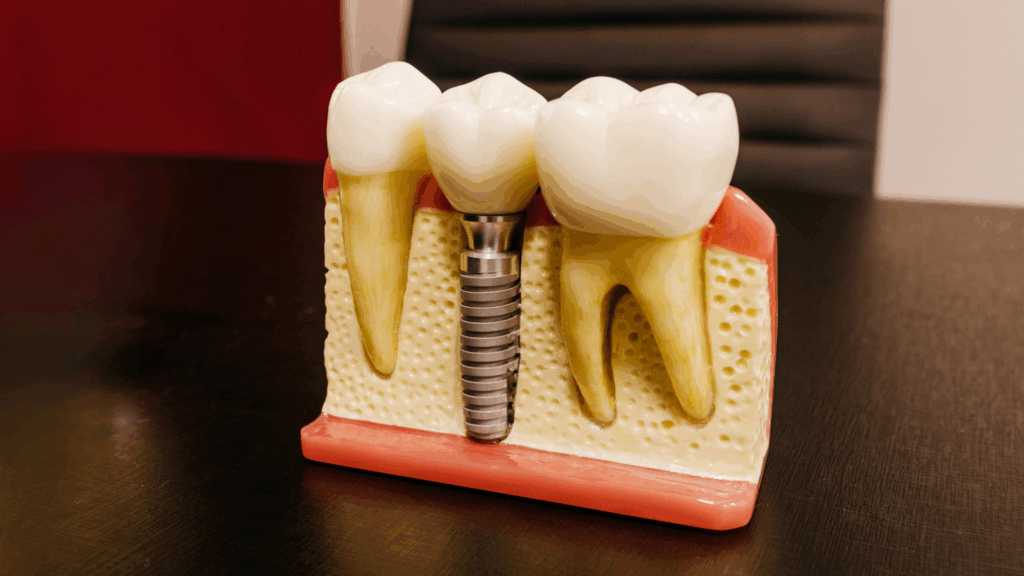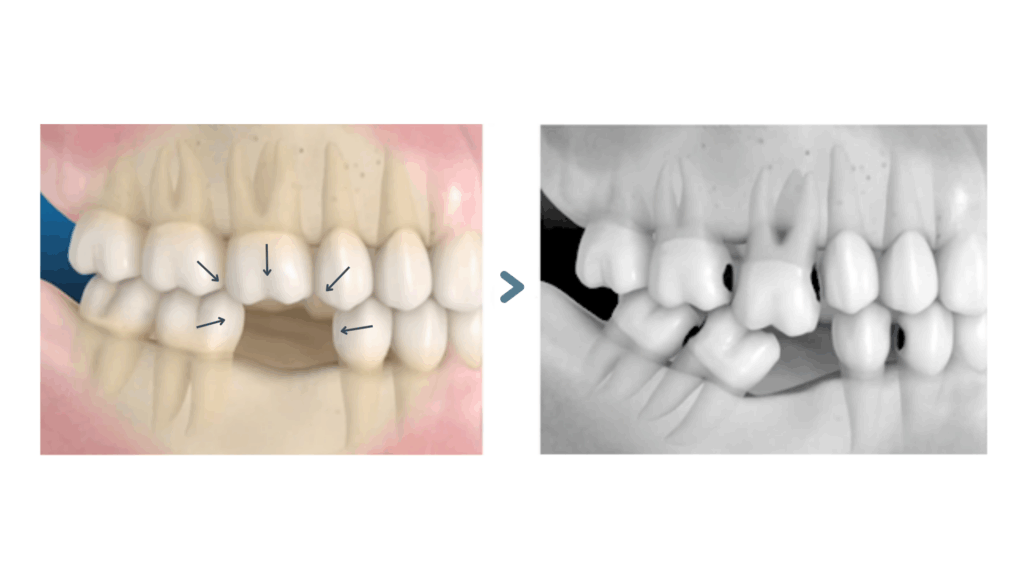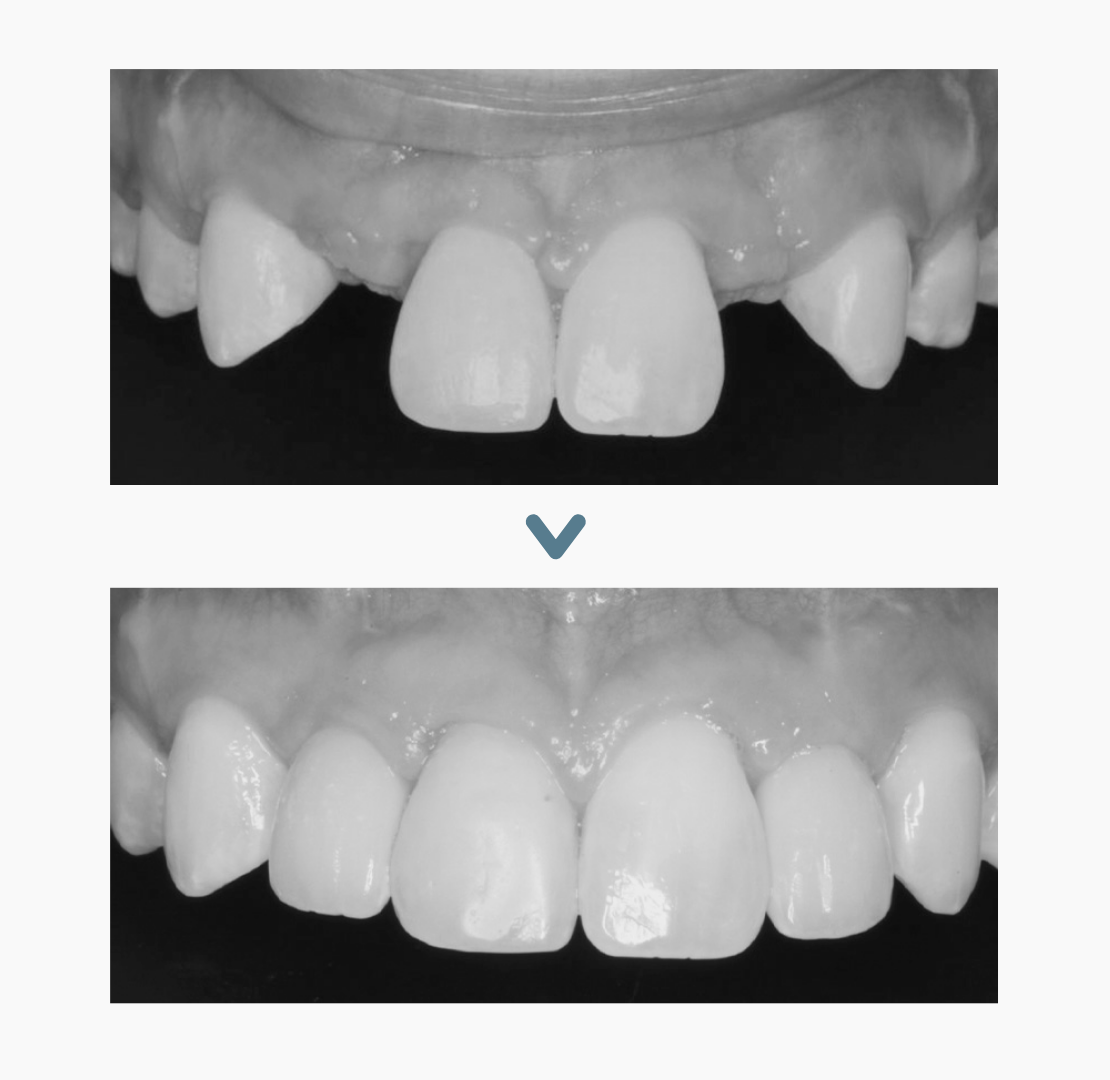When you lose a tooth, it affects far more than just your smile. A missing tooth can make chewing uncomfortable, cause nearby teeth to shift, and even lead to gradual bone loss in your jaw. Many patients are surprised to learn how quickly oral health can change after tooth loss. Fortunately, advances in oral surgery make it possible to restore both function and appearance with a solution that feels and looks like a real tooth: the single tooth implant.

At Seaforth Oral Surgery in Montreal, our team of oral and maxillofacial surgeons specializes in dental implant surgery. Whether your tooth loss was caused by injury, decay, or a congenital absence, we develop a comprehensive treatment plan after a thorough assessment of your oral health and specific needs—always with comfort, safety, and long-term results in mind.

The Essentials of Single Tooth Dental Implants
- A single tooth implant replaces a missing tooth with a stable, natural-looking solution.
- Unlike a dental bridge, it does not damage or rely on adjacent teeth.
- The dental implant procedure involves a titanium metal post (artificial tooth root), an abutment, and a crown.
- It prevents bone loss, protects surrounding teeth, and restores chewing strength.
- With proper care, single tooth implants can last a lifetime.
Why Replacing Even One Missing Tooth Matters
When people think of tooth replacement, they often imagine full dentures or multiple missing teeth. But even a single gap from a missing tooth can lead to:

- Shifting of neighbouring teeth: Gaps cause nearby teeth to tilt or drift, creating bite misalignment.
- Oral health risks: Misaligned teeth are harder to clean, raising the risk of cavities and gum disease.

- Bone deterioration: Without the stimulation of a tooth root, the jawbone shrinks over time.
- Appearance changes: Bone loss can alter facial structure, leading to a prematurely aged look.
By choosing a single tooth dental implant, patients preserve jawbone health and maintain natural function, avoiding long-term complications.
What Is a Single Tooth Implant?
A single tooth implant is the gold standard for replacing one tooth. It consists of three main components:
- Implant post (metal implant): A titanium artificial tooth root surgically placed into the jawbone.
- Abutment: The small piece that protrudes from the gum and serves as the base for the crown.
- Final crown (replacement tooth): A custom-crafted new tooth made just the right size, shape, and color to blend seamlessly with your natural teeth.

Replacement teeth are custom-made and securely mounted onto the titanium implant to restore both function and appearance.
Unlike a dental bridge, which relies on grinding down adjacent teeth for support, a single implant stands alone. This protects the integrity of other teeth and provides a long-term solution that closely mimics a real tooth.
When to Choose a Single Tooth Dental Implant
Common Situations
- Tooth loss from injury or accident.
- Extraction due to severe decay or infection.
- Congenital absence (a permanent tooth that never developed).
Who Is a Candidate?
Most adults missing a single tooth may qualify for a dental implant procedure, provided they have:
- Enough healthy bone in the jaw to support the implant.
- Healthy gums free of untreated periodontal disease.
- No uncontrolled medical conditions (such as diabetes, bleeding disorders, or advanced liver disease) that could affect eligibility for dental implants.
- A medical history that allows for minor surgery.
During your consultation, our oral surgeons will review your case, check for adequate bone, and ensure your overall oral health supports treatment.
The Dental Implant Procedure: Step by Step
The dental implant procedure is carefully staged to maximize comfort and long-term success.

1. Initial Consultation & Planning
Your oral surgeon takes a full medical history, performs an exam, and uses 3D scans to evaluate bone density, sinus cavities, and gum tissue.
2. Dental Implant Placement
During implant surgery, a metal post is placed into the jawbone. This is typically done under local anesthesia, combined with IV sedation for comfort.
3. Healing & Osseointegration
Over the next few months, the jawbone naturally fuses with the metal implant through a process called osseointegration. This forms a stable foundation, similar to a natural tooth root. The healing time between implant placement and final restoration can vary depending on the location in the jaw and individual healing factors.
4. Final Crown Placement
Once the implant site and gums have fully healed, a custom final crown (your new artificial tooth) is secured. This marks the completion of the entire process, giving you a replacement tooth that looks, feels, and functions like the original.
Same-Day Dental Implant Options

Some patients may be candidates for same-day implant surgery, also known as immediate implant temporization. This involves placing a temporary replacement tooth on the same day as the implant surgery.
However, same-day options depend on:
- Having enough healthy bone for stability.
- No active gum infection.
- Implant site location (front teeth often more suitable than back molars).
Learn more about same-day dental implants at Seaforth Oral Surgery.
Bone Grafting and Special Considerations
Not every patient has enough bone to support a dental implant right away. In cases of significant bone loss, bone grafting may be necessary to build adequate bone for support.
When bone grafting is required:
- Long-term tooth loss leading to bone resorption.
- Thin upper jaw where sinus cavities are close to the implant site.
- Patients with prior gum disease or infections affecting bone.
- Our maxillofacial surgeons use advanced surgical procedures to restore bone volume, ensuring safe and predictable dental implant placement.
Benefits Beyond the Smile
Choosing single tooth dental implants offers advantages that extend far beyond appearance:
- Chewing efficiency: Restores bite strength without compromising other teeth.
- Jawbone preservation: Prevents resorption by stimulating the bone, just like a tooth root.
- Long term solution: With good care, most dental implants last 20+ years, or often a lifetime.

Cost of a Single Tooth Implant in Montreal
The cost of a single implant in Montreal generally ranges between $3,000 and $6,000. This reflects several factors:
- Surgical procedures (implant placement, possible bone grafting).
- Materials (type of metal implant, abutment, and crown).
- The expertise of a dental specialist such as an oral surgeon.
- Coverage through your dental plan and available financing options.
While an investment, a dental implant replaces a missing tooth more reliably than other options, making it a strong long-term value.
Caring for Your Dental Implant
A single tooth implant is easy to maintain with proper daily care:
- Brush twice daily, focusing on the gum tissue around the implant site.
- Floss or use interdental brushes designed for implant teeth.
- Schedule regular visits with your dentist to check bone stability and gum health.
With consistent oral hygiene and check-ups, a single implant can perform like a real tooth for decades.
Risks and How to Reduce Them
Like all surgical procedures, dental implant surgery carries some risks, though complications are rare in healthy patients.
Potential risks include:
- Infection at the implant site.
- Implant failure if the bone does not integrate.
- Sinus problems when placing implants in the upper jaw.
Risk reduction strategies:
- Choose experienced oral and maxillofacial surgeons.
- Follow all post-op care instructions carefully.
- Avoid smoking, which interferes with healing and bone growth.
FAQ
Is a single tooth implant painful?
Thanks to local anesthesia and sedation, most patients describe the implant surgery as comfortable. Mild soreness after is normal and manageable with medication.
How long do single tooth implants last?
With good care, most dental implants last 20 years or longer. Many patients keep them for life.
What if I don’t have enough bone for an implant?
Your oral surgeon may recommend bone grafting to restore adequate bone for safe dental implant placement.
Key Takeaways
- A single tooth implant is the gold standard for tooth replacement in Montreal.
- It preserves oral health, protects adjacent teeth, and restores natural function.
- The entire process involves planning, implant surgery, healing, and a final crown.
- With expert care, it is a long term solution that looks and feels like a real tooth.

Ready to Restore Your Smile?
If you’re considering a single tooth implant in Montreal, trust the experts at Seaforth Oral Surgery Clinic. Our team of oral surgeons provides compassionate, evidence-based care for every patient.
Book your consultation today and take the first step toward a strong, confident smile.
When you lose a tooth, it affects far more than just your smile. A missing tooth can make chewing uncomfortable, cause nearby teeth to shift, and even lead to gradual bone loss in your jaw. Many patients are surprised to learn how quickly oral health can change after tooth loss. Fortunately, advances in oral surgery make it possible to restore both function and appearance with a solution that feels and looks like a real tooth: the single tooth implant.

At Seaforth Oral Surgery in Montreal, our team of oral and maxillofacial surgeons specializes in dental implant surgery. Whether your tooth loss was caused by injury, decay, or a congenital absence, we develop a comprehensive treatment plan after a thorough assessment of your oral health and specific needs—always with comfort, safety, and long-term results in mind.

The Essentials of Single Tooth Dental Implants
- A single tooth implant replaces a missing tooth with a stable, natural-looking solution.
- Unlike a dental bridge, it does not damage or rely on adjacent teeth.
- The dental implant procedure involves a titanium metal post (artificial tooth root), an abutment, and a crown.
- It prevents bone loss, protects surrounding teeth, and restores chewing strength.
- With proper care, single tooth implants can last a lifetime.
Why Replacing Even One Missing Tooth Matters
When people think of tooth replacement, they often imagine full dentures or multiple missing teeth. But even a single gap from a missing tooth can lead to:

- Shifting of neighbouring teeth: Gaps cause nearby teeth to tilt or drift, creating bite misalignment.
- Oral health risks: Misaligned teeth are harder to clean, raising the risk of cavities and gum disease.

- Bone deterioration: Without the stimulation of a tooth root, the jawbone shrinks over time.
- Appearance changes: Bone loss can alter facial structure, leading to a prematurely aged look.
By choosing a single tooth dental implant, patients preserve jawbone health and maintain natural function, avoiding long-term complications.
What Is a Single Tooth Implant?
A single tooth implant is the gold standard for replacing one tooth. It consists of three main components:
- Implant post (metal implant): A titanium artificial tooth root surgically placed into the jawbone.
- Abutment: The small piece that protrudes from the gum and serves as the base for the crown.
- Final crown (replacement tooth): A custom-crafted new tooth made just the right size, shape, and color to blend seamlessly with your natural teeth.

Replacement teeth are custom-made and securely mounted onto the titanium implant to restore both function and appearance.
Unlike a dental bridge, which relies on grinding down adjacent teeth for support, a single implant stands alone. This protects the integrity of other teeth and provides a long-term solution that closely mimics a real tooth.
When to Choose a Single Tooth Dental Implant
Common Situations
- Tooth loss from injury or accident.
- Extraction due to severe decay or infection.
- Congenital absence (a permanent tooth that never developed).
Who Is a Candidate?
Most adults missing a single tooth may qualify for a dental implant procedure, provided they have:
- Enough healthy bone in the jaw to support the implant.
- Healthy gums free of untreated periodontal disease.
- No uncontrolled medical conditions (such as diabetes, bleeding disorders, or advanced liver disease) that could affect eligibility for dental implants.
- A medical history that allows for minor surgery.
During your consultation, our oral surgeons will review your case, check for adequate bone, and ensure your overall oral health supports treatment.
The Dental Implant Procedure: Step by Step
The dental implant procedure is carefully staged to maximize comfort and long-term success.

1. Initial Consultation & Planning
Your oral surgeon takes a full medical history, performs an exam, and uses 3D scans to evaluate bone density, sinus cavities, and gum tissue.
2. Dental Implant Placement
During implant surgery, a metal post is placed into the jawbone. This is typically done under local anesthesia, combined with IV sedation for comfort.
3. Healing & Osseointegration
Over the next few months, the jawbone naturally fuses with the metal implant through a process called osseointegration. This forms a stable foundation, similar to a natural tooth root. The healing time between implant placement and final restoration can vary depending on the location in the jaw and individual healing factors.
4. Final Crown Placement
Once the implant site and gums have fully healed, a custom final crown (your new artificial tooth) is secured. This marks the completion of the entire process, giving you a replacement tooth that looks, feels, and functions like the original.
Same-Day Dental Implant Options

Some patients may be candidates for same-day implant surgery, also known as immediate implant temporization. This involves placing a temporary replacement tooth on the same day as the implant surgery.
However, same-day options depend on:
- Having enough healthy bone for stability.
- No active gum infection.
- Implant site location (front teeth often more suitable than back molars).
Learn more about same-day dental implants at Seaforth Oral Surgery.
Bone Grafting and Special Considerations
Not every patient has enough bone to support a dental implant right away. In cases of significant bone loss, bone grafting may be necessary to build adequate bone for support.
When bone grafting is required:
- Long-term tooth loss leading to bone resorption.
- Thin upper jaw where sinus cavities are close to the implant site.
- Patients with prior gum disease or infections affecting bone.
- Our maxillofacial surgeons use advanced surgical procedures to restore bone volume, ensuring safe and predictable dental implant placement.
Benefits Beyond the Smile
Choosing single tooth dental implants offers advantages that extend far beyond appearance:
- Chewing efficiency: Restores bite strength without compromising other teeth.
- Jawbone preservation: Prevents resorption by stimulating the bone, just like a tooth root.
- Long term solution: With good care, most dental implants last 20+ years, or often a lifetime.

Cost of a Single Tooth Implant in Montreal
The cost of a single implant in Montreal generally ranges between $3,000 and $6,000. This reflects several factors:
- Surgical procedures (implant placement, possible bone grafting).
- Materials (type of metal implant, abutment, and crown).
- The expertise of a dental specialist such as an oral surgeon.
- Coverage through your dental plan and available financing options.
While an investment, a dental implant replaces a missing tooth more reliably than other options, making it a strong long-term value.
Caring for Your Dental Implant
A single tooth implant is easy to maintain with proper daily care:
- Brush twice daily, focusing on the gum tissue around the implant site.
- Floss or use interdental brushes designed for implant teeth.
- Schedule regular visits with your dentist to check bone stability and gum health.
With consistent oral hygiene and check-ups, a single implant can perform like a real tooth for decades.
Risks and How to Reduce Them
Like all surgical procedures, dental implant surgery carries some risks, though complications are rare in healthy patients.
Potential risks include:
- Infection at the implant site.
- Implant failure if the bone does not integrate.
- Sinus problems when placing implants in the upper jaw.
Risk reduction strategies:
- Choose experienced oral and maxillofacial surgeons.
- Follow all post-op care instructions carefully.
- Avoid smoking, which interferes with healing and bone growth.
FAQ
Is a single tooth implant painful?
Thanks to local anesthesia and sedation, most patients describe the implant surgery as comfortable. Mild soreness after is normal and manageable with medication.
How long do single tooth implants last?
With good care, most dental implants last 20 years or longer. Many patients keep them for life.
What if I don’t have enough bone for an implant?
Your oral surgeon may recommend bone grafting to restore adequate bone for safe dental implant placement.
Key Takeaways
- A single tooth implant is the gold standard for tooth replacement in Montreal.
- It preserves oral health, protects adjacent teeth, and restores natural function.
- The entire process involves planning, implant surgery, healing, and a final crown.
- With expert care, it is a long term solution that looks and feels like a real tooth.

Ready to Restore Your Smile?
If you’re considering a single tooth implant in Montreal, trust the experts at Seaforth Oral Surgery Clinic. Our team of oral surgeons provides compassionate, evidence-based care for every patient.
Book your consultation today and take the first step toward a strong, confident smile.







